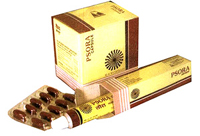Psora Ointment, an Ayurvedic product, is designed to support tissue regeneration and repair. It offers a non-steroidal approach to addressing fungal, protozoal, and bacterial infections. The ointment effectively reduces inflammation, soothes itching, and diminishes redness, plaque, and other skin conditions. The main ingredients for psora ointment are as follows. Arand oil, also known as Castor oil, is derived from the seeds of the Ricinus communis plant. Its moisturizing and soothing properties have made it a popular ingredient in skincare products. Neem oil, derived from the seeds of the Neem tree (Azadirachta indica), is widely recognized for its antibacterial, antifungal, and anti-inflammatory properties. It is often used in skincare products targeting issues like acne and eczema.
